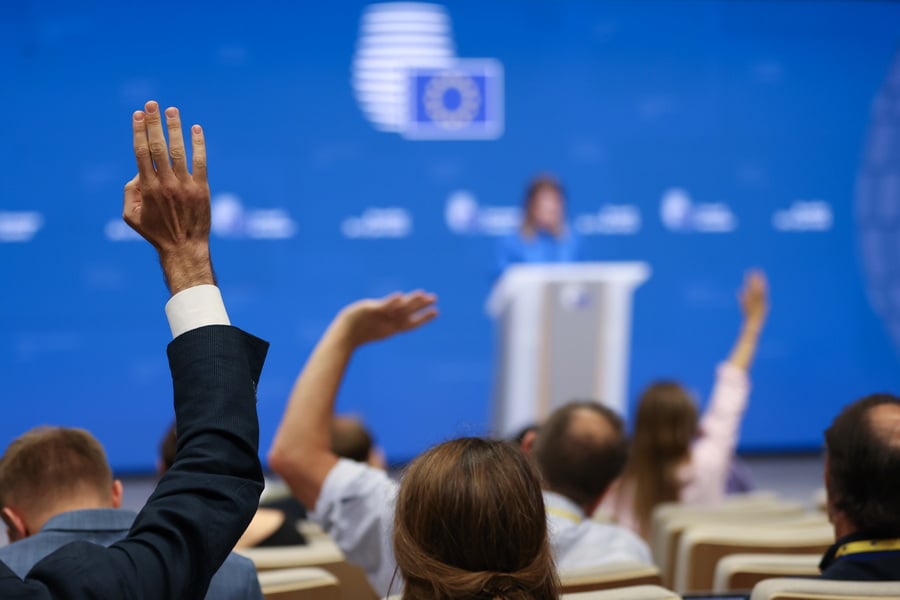“My task is not to write positively about the EU, I do not try to idealize the EU, I just write in a balanced way and bring information that shows what the EU really does, why it does it and how it affects us all,” says Tereza Šupová, Brussels-based Czech correspondent for the Czech News Office.
– What initiatives does your organization have to produce reliable and fact-based information about the EU? What criteria or methods do you apply to ensure that your EU-related content is trustworthy?
-Writing reliable and factual information about the EU requires diligence, verification of sources and the ability to explain often complex topics in a clear manner. It is also necessary to understand the EU structures and institutions.
Firstly, I use trusted and official sources, i.e. the websites of the institutions or their accounts on X. I have contacts with the institutions’ spokespersons and the representations of the states to the EU, where I verify the information.
Read also
Secondly, I verify information from multiple sources, I do not take unverified reports from blogs or social networks, and I avoid speculation. I try to quote accurately. I do not oversimplify, because this often leads to distortion.
Thirdly, I work in a press agency, so my work is independent, fast, accurate and unbiased. I do not write any comments, only facts, and communicate information.
– In your view, what are the key factors that shape public trust toward the EU, and what steps are you taking to strengthen those factors? Do you run specific programs or partnerships aimed at deepening trust in the EU?
-I think the key is to communicate clearly, to explain what the EU does in clear language. To emphasise the concrete benefits of the EU in everyday life, not to adopt the often complex language of the EU institutions. You want ordinary citizens to understand what you are writing. It is often a difficult task because you have to simplify things, but not in such a way that you distort them and change the content of the message.
I think my agency has some kind of partnership with the European Parliament office in Prague and together we organize seminars, especially for young journalists and journalism students, where we talk about how the EU works. But I don’t know any details, just that every year, as part of one of the seminars, I also talk about my experiences from Brussels.
– How do you create and disseminate positive narratives and stories about the EU? Which platforms or media tools do you use most effectively to reach audiences with these stories? Could you share examples of projects that have successfully contributed to a more positive perception of the EU?
-My task is not to write positively about the EU, I do not try to idealize the EU, I just write in a balanced way and bring information that shows what the EU really does, why it does it and how it affects us all. I try to speak in simple language, I give specific examples from real life (for example, what EU money is supposed to go for), concrete impacts.
It is also important to show readers that the EU is not someone “out there”, but that it is “us”, that we are part of it. That we as member states or our representatives influence all EU decisions.
– Does your organization have a developed strategy for consistently presenting a reliable and positive image of the EU? What innovative approaches or media formats have you used to engage younger audiences or social media users?
-I doubt we have any such strategy. We always follow the same rules when it comes to any reporting. That means verified information, objective information, we cite our sources. We report on the positions of all interested parties, but at the same time we prevent the abuse of this rule by marginal groups.
We use anonymous sources only if the information cannot be obtained openly and that this information is essential to the report. An anonymous source must not be a source of opinion, accusation or speculation. We are independent, impartial, we do not express our opinions in the reports, we do not engage in any political party.
We organize various trainings for young audiences and use social networks.
– Much has been said about disinformation and debunking. How do you see the balance between countering disinformation and proactively building a positive and reliable image of the EU? Do you also work preventively, by spreading trustworthy and positive content before disinformation starts circulating?
-Disinformation is not just untruths – it is the deliberate dissemination of misleading or false information, often with the aim of undermining trust in the EU or dividing society.
An example of what has emerged as disinformation in the Czech Republic:
“The EU has banned curved cucumbers.”
“The EU dictates what we are allowed to eat/drink/say.”
“The Czech Republic sends billions to Brussels and gets nothing in return.”
“The EU forces states to accept migrants.”
How to fight it? Quickly and accurately refute myths, write clearly and factually, do not use unverified sources. Do not wait for rumors, explain key EU decisions and processes in advance. Show what the EU is doing and why, in simple language.
It is especially important to increase people’s media and information literacy, teach people to read news critically, verify sources, recognize manipulation, and not believe everything they see and read.
We journalists can – write balancedly and with context, explain, and even provide the voices of experts and analysts.
Anna ISRAELYAN























































